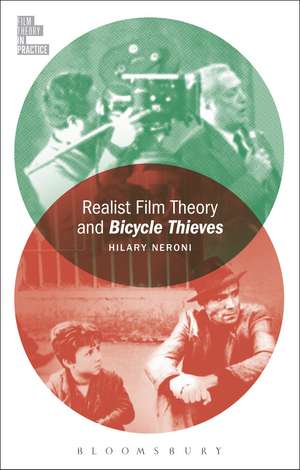Realist Film Theory and Bicycle Thieves: Film Theory in Practice
Autor Hilary Neronien Limba Engleză Paperback – 14 iun 2023
| Toate formatele și edițiile | Preț | Express |
|---|---|---|
| Paperback (1) | 99.68 lei 3-5 săpt. | +30.74 lei 4-10 zile |
| Bloomsbury Publishing – 14 iun 2023 | 99.68 lei 3-5 săpt. | +30.74 lei 4-10 zile |
| Hardback (1) | 343.11 lei 6-8 săpt. | |
| Bloomsbury Publishing – 14 iun 2023 | 343.11 lei 6-8 săpt. |
Preț: 99.68 lei
Preț vechi: 122.27 lei
-18% Nou
Puncte Express: 150
Preț estimativ în valută:
19.07€ • 19.97$ • 15.78£
19.07€ • 19.97$ • 15.78£
Carte disponibilă
Livrare economică 17-31 martie
Livrare express 28 februarie-06 martie pentru 40.73 lei
Preluare comenzi: 021 569.72.76
Specificații
ISBN-13: 9781501378591
ISBN-10: 1501378597
Pagini: 184
Dimensiuni: 127 x 197 x 16 mm
Greutate: 0.21 kg
Editura: Bloomsbury Publishing
Colecția Bloomsbury Academic
Seria Film Theory in Practice
Locul publicării:New York, United States
ISBN-10: 1501378597
Pagini: 184
Dimensiuni: 127 x 197 x 16 mm
Greutate: 0.21 kg
Editura: Bloomsbury Publishing
Colecția Bloomsbury Academic
Seria Film Theory in Practice
Locul publicării:New York, United States
Caracteristici
Gives an extensive background on realist film theory, Italian Neorealism, and the film Bicycle Thieves
Notă biografică
Hilary Neroni is Professor of Film and Television Studies at the University of Vermont, USA. She is the author of Feminist Film Theory and Cléo from 5 to 7 (Bloomsbury, 2016), The Subject of Torture (2015), and The Violent Woman (2005) and has also published numerous essays on film and theory.
Cuprins
DedicationIntroduction1. Realist Film Theory2. Realist Film Theory and Bicycle ThievesConclusionIndex
Recenzii
Neroni's Realist Film Theory and Bicycle Thieves brilliantly distils the conceptual moves and political stakes of Neorealism, while making an original and compelling case for the contemporary revitalization of realist film theory. By emphasizing realism's dependence on mediation, Neroni eloquently argues for the radical power of the realist form to reveal the ways in which our reality is structured. Her novel reading of Bicycle Thieves powerfully demonstrates how filmic realism's vital relationship to melodrama enables viewers to forge new relationships to the social order.
Grounded in traditional theorists of realism such as Bazin and Kracauer, Neroni's book takes a welcome and unexpected turn, adroitly charting the rise of a postwar Italian neorealism in which melodrama (of all genres!) was deployed to impugn the ideological structures through which individuals understood and experienced the world around them. Neroni's indispensable close reading of Bicycle Thieves combines history, theory, and semiotic analysis to make clear how neorealist figures such as De Sica, Zavattini, and Visconti weaponized melodrama to expose and ultimately fracture the mediation of the social order, inspiring generations of filmmakers to follow.
Hilary Neroni's new book is a refreshing and original reevaluation of reality, realism, and realist cinema with a range and scope that is both exhilarating and expansive. Lucidly written and theoretically rigorous-a significant accomplishment in itself-the book offers readers the history of realist theory in film as well as contemporary engagements with realism in global cinema. A must read for both beginner and advanced students and scholars of cinema.
Grounded in traditional theorists of realism such as Bazin and Kracauer, Neroni's book takes a welcome and unexpected turn, adroitly charting the rise of a postwar Italian neorealism in which melodrama (of all genres!) was deployed to impugn the ideological structures through which individuals understood and experienced the world around them. Neroni's indispensable close reading of Bicycle Thieves combines history, theory, and semiotic analysis to make clear how neorealist figures such as De Sica, Zavattini, and Visconti weaponized melodrama to expose and ultimately fracture the mediation of the social order, inspiring generations of filmmakers to follow.
Hilary Neroni's new book is a refreshing and original reevaluation of reality, realism, and realist cinema with a range and scope that is both exhilarating and expansive. Lucidly written and theoretically rigorous-a significant accomplishment in itself-the book offers readers the history of realist theory in film as well as contemporary engagements with realism in global cinema. A must read for both beginner and advanced students and scholars of cinema.













